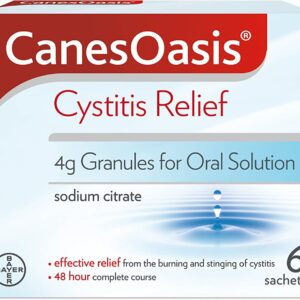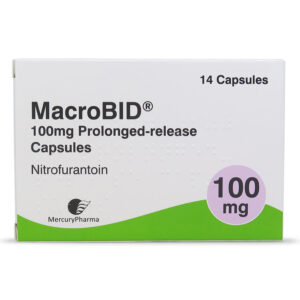Cystitis
Cystitis is a non-contagious urinary tract infection (UTI) which is most prevalent in women. We offer a number of treatments to bring relief from this uncomfortable condition, which you can order online and have delivered straight to your door.
What is Cystitis?
Cystitis is a common urinary tract infection which affects 2% of the female population. It is estimated that 90% of Cystitis diagnoses are found in women.
The reason women are at a greater risk of developing a UTI than men is due to the shorter distance between the anus (back passage) and the urethra. This increases the likeliness of bacteria from the rectum entering the urethra. The condition can be mild and can clear itself within a few days. In other cases, cystitis can reoccur. For these cases, your doctor may recommend treatment.
Moreover, the female urethra is shorter than the male urethra. Due to this, the bacteria can reach the bladder quicker in women than in men.
The symptoms of Cystitis include:
- Blood in urine
- Burning sensation when urinating
- Cloudy urine
- Foul-smelling urine
- Frequent urination
- Lower abdominal pain
While cystitis itself is easily treatable, it can lead to complications such as a kidney infection. If you don’t notice your symptoms improving, you should speak to your doctor for further advice.
What causes Cystitis?
Cystitis is caused by bacteria. In most cases, escherichia coli (E coli) from the patients own bowel are the cause. Other bacteria which can cause a UTI are Pseudomonas and Staphylococci. Bacteria can also develop in the bladder in cases when the bladder cannot completely empty, often due to an obstruction.
Though Cystitis is not a sexually transmitted infection, sexual intercourse can increase the risk of developing a Cystitis infection.
Obstruction or damage to the urethra can also lead to a cystitis infection.
UTIs can occur in any part of the urinary system, including the kidneys, bladder and urethra. Cystitis relates specifically to the bladder.
The following increases the risk of developing UTIs:
- Bladder obstruction or abnormality (bladder stones, diverticula, tumour)
- Diabetes
- Injury or abnormality to the spinal cord
- Kidney obstruction or abnormality (horseshoe kidney, kidney stones, polycystic kidney)
- Menopause
- Pregnancy (baby pressing on bladder)
- Sexual intercourse
- Urethral obstruction or abnormality (Catheters, enlarged prostate, gland urethral stricture, stents)
- Using a diaphragm for contraception
- Wiping back to front when going to the toilet
If you encounter recurrent cystitis infections, arrange an appointment with your GP. Depending on whether your cystitis infection is related to intercourse or not, they may be able to prescribe a continuous course of antibiotics.
How is Cystitis treated?
In some cases, the symptoms of Cystitis can be managed at home. If you’ve had a Cystitis infection before and aware of the symptoms, or if your symptoms are mild and have lasted for less than 3 days, you may not be required to arrange an appointment with your GP.
Alternatively, Cystitis can be treated with a short course of antibiotics. The antibiotics help to rid the infection from your urinary system, providing relief from the symptoms.
Prescription doctor offer two antibiotics to treat cystitis – Nitrofurantoin 100mg and Trimethoprim.
It is important that, when taking antibiotics, you follow your doctor’s advice. Taking antibiotics too frequently, or when they are not needed, can lead to antimicrobial resistance, which reduces the effectiveness of antibiotics when you do need them.
You can take paracetamol or ibuprofen to relieve any pain you are experiencing. You should speak to your doctor before taking any medicine to ensure it is safe for you.
Avoid sexual intercourse until the infection has cleared. While the infection isn’t sexually transmitted, sexual intercourse can be the cause of infection and, as such, can cause the infection to come back or make your current symptoms worse.
It’s important to drink lots of fluids while fighting an infection, especially a urinary tract infection. UTIs, such as Cystitis, can increase the amount of times you need to go to the toilet. In turn, your body loses more fluids. Stay hydrated by drinking plenty of water.
You should arrange an appointment with your GP if any of the following applies to you:
- You are a man experiencing symptoms of a UTI
- You are pregnant and experiencing symptoms of a UTI
- You have blood in your urine
- You have not had a UTI before
- Your symptoms come back after treatment
- Your symptoms do not improve or worsen within a few days
There are a number of natural remedies for Cystitis, including cranberry juice and tablets, D-mannose and pro-biotics. However, it is unclear how effective these remedies are at ridding bacterial infections from the urethra.
You can order treatments online for Cystitis from Prescription Doctor. Our UK registered pharmacy dispatches all orders in discreet packaging which gives no indication of the contents.
Tips on preventing Cystitis
There are a number of ways to reduce your risk of developing UTIs. These include:
- Avoid resisting going to the toilet
- Avoid using spermicidal lube on barrier contraceptives
- Avoiding perfumed bubble bath or soap
- Drink plenty of fluids
- Go to the toilet as soon as you can after having sex
- Take showers instead of baths
- Try to empty your bladder when you go to the toilet
- Wear loose cotton underwear
- Wipe from front to back when going to the toilet
WOMEN'S HEALTH
WOMEN'S HEALTH
WOMEN'S HEALTH




